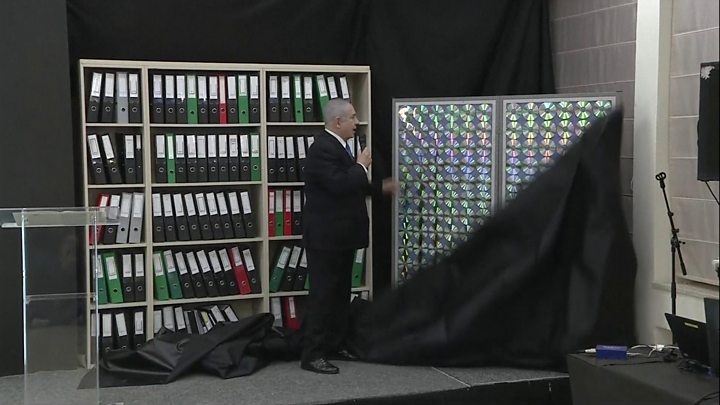
Media playback is unsupported on your device
Iran has called Israeli Prime Minister Benjamin Netanyahu a "liar" after he accused the country of deceiving the world about its nuclear intentions.
Mr Netanyahu produced what he said were copies of Iranian files detailing a project to build nuclear weapons, which was reportedly mothballed 15 years ago.
Iran said it had never sought to build a bomb when it signed an international deal to curb nuclear activity in 2015.
US President Donald Trump has threatened to pull out of the deal.
American allies like the UK and France have called for the agreement to be maintained, arguing that Iran has abided by it, steadily reducing its capacity to produce weapons-grade uranium.
Hostility between Israel and Iran, already bitter enemies, has grown as Iran builds up its military in Syria, on Israel's doorstep.
What did Iran say?
The foreign ministry said Mr Netanyahu's allegations were "worn-out, useless and shameful".
Foreign Minister Javad Zarif said Mr Netanyahu was trying to influence Mr Trump in his decision over whether to stick with the nuclear deal.
He said the documents were a rehash of old allegations already dealt with by the International Atomic Energy Agency (IAEA), the UN's nuclear watchdog.
What is the thrust of Israel's case?
Israel says that Iran is not a reliable partner and the 2015 agreement was reached in bad faith.
Speaking after Mr Netanyahu's presentation of the alleged secret Iranian files, Mark Regev, the Israeli ambassador to London, said the Iranian government had deliberately concealed its military nuclear programme.
"It appears we've caught them red-handed lying about what is ultimately a crucial element in the deal, one which is a prerequisite for future implementation of that very deal," he said.
Not only did Mr Netanyahu give alleged details of "Project Amad", the Iranian nuclear weapons programme reportedly mothballed in 2003, but he said the project had continued at the Iranian defence ministry.
He quoted the head of the alleged programme as saying "special activities" would continue "under the title of scientific know-how developments".
Such work continued this year, Mr Netanyahu said, without giving evidence.
How has the IAEA reacted?
It pointed out that one of its own reports from 2015 had identified some Iranian activities in 2003 "relevant to the development of a nuclear explosive device".
There had been "no credible indications of activities in Iran relevant to the development of a nuclear explosive device after 2009", according to that report.
What does the US say?
The White House initially responded to Mr Netanyahu's allegations by saying they were consistent with its understanding that Iran "has" a "robust, clandestine nuclear weapons" programme.
However, it later corrected the statement by changing the tense of the verb to "had", blaming a "clerical error".
Donald Trump has asked for permanent restrictions on Iran's uranium enrichment.
He has warned the US will abandon the deal on 12 May - the next deadline for waiving sanctions - unless European signatories to the deal and Congress address his concerns.
What about other key players?
France said the Israeli findings could "confirm the need for longer-term assurances on the Iranian programme".
The evidence appeared to confirm what European powers had known for more than a decade and a half, it added.
British Foreign Secretary Boris Johnson said Mr Netanyahu's presentation on Iran's past nuclear weapons research underlined the "importance of keeping the Iran nuclear deal's constraints on Tehran's nuclear ambitions".
"The Iran nuclear deal is not based on trust about Iran's intentions; rather it is based on tough verification," he said.
EU Foreign Policy Chief Federica Mogherini said the documents had not put into question Iran's compliance with the deal but they should be analysed by the IAEA.
What is the 2015 deal?
The agreement signed between Iran, the US, China, Russia, Germany, France and Britain lifted crippling economic sanctions in return for curbs on Tehran's nuclear programme.
Under the Joint Comprehensive Plan of Action (JCPOA), Iran is committed to slashing the number of its centrifuges, which are machines used to enrich uranium.
It is also meant to cut its stockpile of enriched uranium drastically and not enrich remaining uranium to the level needed to produce nuclear weapons.
Read Again http://www.bbc.com/news/world-middle-east-43960836Bagikan Berita Ini















0 Response to "Iran nuclear row: Tehran says Israel's Netanyahu lied"
Post a Comment